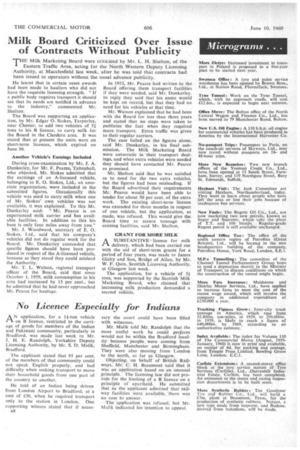Milk Board Criticized Over Issue of Contracts Without Publicity
Page 42

If you've noticed an error in this article please click here to report it so we can fix it.
THE Milk Marketing Board were criticized by Mr. L. H. Shelton, of the Eastern Traffic Area, acting for the North Western Deputy Licensing Authority, at Macclesfield last week, after he was told that contracts had been issued to operators without the usual advance publicity.
He learnt that in certain cases awards had been made to hauliers who did not have the requisite licensing strength. "If a public body requires transport it should see that its needs are notified in advance to the industry," commented Mr. Shelton.
The Board was supporting an application, by Mr. Edgar 0. Stokes, Tarporley, near Chester, to add two vehicles of 51 tons to his B licence, to carry milk for the Board in the Cheshire area. It was stated that at present the units were on short-term licences, which expired on June 30.
Another Vehicle's Earnings Included
During cross-examination by Mr. J. A. Dunkerley, for Mr. F. Pearce, Tattenhall, who objected, Mr. Stokes admitted that the earnings of an A-licensed vehicle, belonging to E. 0. Stokes, Ltd., an associate organization, were included in the submitted figures. Occasionally this vehicle was used to carry milk when one of Mr. Stokes' own vehicles was not available, it was explained. To this Mr. Dunkerley said; "Mr. Pearce is an experienced milk carrier and has available facilities. In addition to this his base is only four miles away from you."
Mr. J. Woodward, secretary of E. 0. Stokes, Ltd., said that his company's vehicles did not do regular work for the Board. Mr. Dunkerley contended that specific figures should have been produced in respect of the A-licensed vehicle, because as they stood they could mislead the Authority.
Mr. T. L. Watson, regional transport officer of the Board, said that since October 1, 1959, milk consumption in his area had increased by 15 per cent., but he admitted that he had never approached Mr. Pearce for haulage.
In 1953, Mr. Pearce had written to the Board offering them transport facilities if they were needed, said Mr. Dunkerley. In reply they said that his name would be kept on record, but that they had no need for his vehicles at that time.
Mr. Watson explained that he had been with the Board for less than three years and stated that no steps were taken to publicize the fact when they required more transport. Extra traffic was given to their regular carriers.
The case failed on the figures alone, said Mr. Dunkerley, in his final submission. The Milk Marketing Board were autocratic in their transport dealings, and when extra vehicles were needed they should have contacted Mr. Pearce as promised.
Mr. Shelton said that he was satisfied as to need for the two extra vehicles, but the figures had been misleading. If the Board advertised their requirements Mr. Pearce would have been able to tender for about 50 per cent, of the extra work. The existing short-term licence was extended for three months in respect of one vehicle, but the application, as .made, was refused. This would give the Board time to secure tonnage with existing facilities, said Mr. Shelton.
GRANT FOR MORE MILK
A SUBSTANTIVE', licence for milk r'tdelivery, which bad been carried out with the aid of short-term grants for a period of four years, was made to James Gielty and Son, Bridge of Allan, by Mr. W. F. Quin, Scottish Licensing Authority, at Glasgow last week.
The application, for a vehicle of 31 tons, was supported by the Scottish Milk Marketing Board, who claimed that increasing milk production demanded a second vehicle.




















































































































































